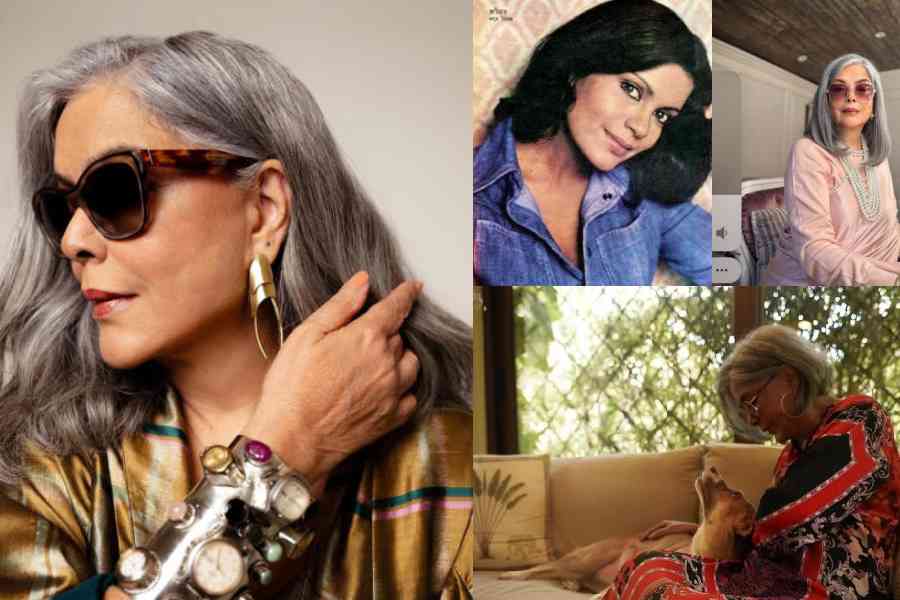If there is a human equivalent of a handbook on how to live life to the fullest, looking at the past with both nostalgia and pragmatism and savouring every moment in the present even as she documents the little things in life that spark joy, that would be Zeenat Aman.
The Hindi film diva of the ’70s and ’80s, considered way ahead of her time, made a splash very early on as Jasbir/Janice in Dev Anand’s Hare Rama Hare Krishna (1971), with the role showcasing the young Zeenat’s powerful acting chops as well as her electric screen presence.
In a career spanning several decades, Aman has appeared in over 80 films, with a host of iconic outings, including Satyam Shivam Sundaram (1978), Qurbani (1980) and a bunch of films with Amitabh Bachchan, including the iconic Don (1978), and many, many more.
Now, even as she gets ready with two projects — Bun Tikki, alongside Shabana Azmi, and the Netflix series The Royals, co-starring Bhumi Pednekar and Ishaan Khatter — the screen legend’s popularity and cred on Instagram continue to grow, her honest and authentic posts coming as a breath of fresh air in an otherwise carefully curated medium.
Over a recent exclusive chat with t2oS, Zeenat looked back at the past even while celebrating the present. Like she always has.
Are you someone who is big on nostalgia? Do you like looking back often at life?
In my personal life, on a daily basis, I don’t. But since I started my Instagram journey (in February 2023), I have realised that people do enjoy these stories that I put out about the experiences I have had on set, my time as an actor and the personalities I worked with.
What is the primary emotion when you look back at the remarkable life and career that you have had?
I just wonder how the hell did I do it?! (Laughs) So many years, so many things. I was working round the clock, you know. Like you have cricketers playing their non-stop matches, day after day... it was pretty much the same for me. But then when you are young, you have the energy... if you ask me to do that now, there is no way I could do it.
You and your contemporaries would shoot multiple shifts in a day...
Yes, we were shooting for two-three films a day. We were going from studio to studio, from film to film, from set to set. We had six releases in a year! These days, young actors are very careful about the projects they take up and how much work they will do at a time. For us, it was nothing like that... we were just banging them out, left, right and centre. And if one was lucky, we would have six hits in a year.
It must have got pretty overwhelming or did you revel in the chaos and busyness?
I was like a horse with blinkers on... I just worked. I got up in the morning, showered, changed, had breakfast, went to the studio, worked very long hours, came back home in the night, had a shower and went to bed. And it was pretty much the same thing day after day. I did enjoy my work — no question about that — but I did not realise or understand that it would turn out to be a body of work that would serve me in such a long-standing way.
Your generation worked in six films a year and yet there was an enigmatic, mysterious quality to most of you because you were accessible only on the big screen. While the actors of today may make only one film a year but because of social media and consistent public appearances, they no longer have that enigmatic aura attached to them. That is such a dichotomy, isn’t it?
Absolutely! It is largely because of the digitalisation of entertainment today. Anyone with a phone has access to everything all the time, in terms of entertainment, in terms of news.... And because the stakes have become so high in terms of finances, there are always promotional gigs, travelling.... Actors are available to you all the time, every step of the way. So, definitely, that air of mystery is gone.
But then, cinema today has a far greater reach than it did at our time. We were not so aware of the outreach of cinema. But now on my Instagram, when I get feedback from every corner of the world... Europe, the Americas, West Indies, Africa, then I realise: ‘Oh my God, people all over the world have seen some of the work that I have done.’
‘Trailblazer’, ‘trendsetter’, ‘ahead of the curve’ are just a few of the many descriptors that have been used time and again to describe your career. Did being different from the rest in many ways happen organically?

Priyanka Chopra Jonas
Or was that a niche that you wanted to create for yourself?
Honestly, I have never aimed to carve anything for myself. I did not even plan on a career in films. It happened. And I was accepted in a very unusual niche of a rebel sister who dies at the end of the film (in Hare Rama Hare Krishna). The audience accepted me right from the get-go.
After that, a lot of filmmakers started writing parts for me... which was the good girl, the bad girl, the good-bad girl.... When those films started doing well, I kept getting cast in those roles. Of course, I did get the opportunity to work with some amazing filmmakers.
Now that you are acting both in films and in long-format television, what are the biggest changes that you see on set?
If you are in the craft, then you are an actor everywhere... whether it is on stage or screen... your craft stays the same. You understand your craft, you understand your role.... The director is the big boss of the show. But what I love to see is that there are so many women on set. I have really loved that! The Royals (her upcoming series on Netflix) has been directed by women. Most of the technicians on projects that I have been working on, even in the ads I do on Insta, are women. There are a lot of women directors now. That has been a definite change since my time. In most of my films, I was the only woman on set, apart from the hairdresser, perhaps.
There is also advancement in technology. When we shot in those days, huge reels of celluloid would be sent to the laboratory and developed and when they came back, one could see if any changes were to be made. But now, one can see it straightaway on the monitor whether things are going rightor wrong.
Do you also find the industry more inclusive and lessageist now?
Both the roles (in The Royals and Bun Tikki) that I have done now have been lovely. I can only speak from my own experience and I am so delighted that writers are writing parts for septuagenarians. It is so much fun! I am now working with a different kind of energy.
You blew up on Instagram with your very first post two years ago. Articles were written on how you revolutionised the Instagram game with a record number of followers within a short time. Did that catch you by surprise?
I was just gobsmacked! I had never expected anything like this. I am so grateful for the love and support that I have got.
Was there a specific reason that made you want to join Instagram?
It started with my kids saying: ‘You have so many stories to tell and so much to talk about, why don’t you get on Instagram?’ I said: ‘Listen, I don’t know the logistics’. They said they would take care of the logistics and I just needed to tell my stories.
You are so authentic and honest with your posts, they are a delight. But in this age of instant outrage, do you have a list of dos and don’ts for how you use social media?
I am careful. I came in to write about myself and my experiences. I am not looking to stir up any kind of controversy.
Among the younger lot of actors, is there someone from the Hindi film industry whose work and career you admire?
I see Priyanka (Chopra Jonas) who was a leading lady in Hindi cinema, give up her strong position in India, cross over to America, knock on doors there, spend 10 years building herself in that country and is now hitting it out of the park in Hollywood movies with very well-known directors and a very good set-up. That is something to be admired. To have the courage, to have the gumption, to have the focus and the follow-through to make things happen, I think that is very admirable. In this business, you have to face a lot of rejection. So to have the capacity to accept that rejection and still plough through... that really matters.
How did you handle failure and rejection in your career?
In my work, I never had rejection. What I had was just gossip all the time in the minds of people! And that was something I had to learn to ‘endure’. Apart from that, there was no rejection. My first two films didn’t do too well but after Hare Rama Hare Krishna, I was flooded with work.
It has been a while since we saw you in Calcutta...
I love being in Calcutta... I really do! Whenever I have gone there for any event or any occasion, it has been very special. I do know that the people there are extremely discerning and the cultural fabric of the city has always been highly evolved. Personally, I think it is the most culturally evolved area ofour country.
What do you like doing when you can squeeze out time during your Calcutta visits?
My visits have always been quite short. It has always been about going one day, staying for the event and then leaving the next day. There is very little time. For me, there is always something very soothing about Bengali culture, whether it is the food, the desserts, the music, the poetry... I find it all very poignant. And, of course, the sweets. Even in Mumbai, I always call in for mishti doi and Bengali sweets. I know I shouldn’t (laughs), but I do sometimes. In fact, there is another reason why I love Calcutta. The very first award that I ever received in my career was from the film journalists in Calcutta, which was for Hare RamaHare Krishna.
What is an ideal way to spend the day when you want to chill?
I love spending time at home, with my family, with my dog... seeing what’s happening in the kitchen, pottering around in the garden with my plants. I love quiet, downtime at home watching a show, reading a book, listening to music. Those are my best days when I am not working.
If you met the ’70s version of yourself today, what would you tell her?
I would tell her exactly what I would tell you. Enjoy every step of the journey with your career, with your life. It all goes by too soon. When you reach my age and you look back, you will say: ‘Oh God, where did the time go?!’ So enjoy it, appreciate it, and really live it. Live each day,smell the flowers, enjoy your coffee. When you take that first bite of your lemon tart, enjoy that. Enjoy all of it, each day, every day.









